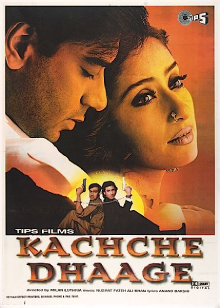Kachche Dhaage
| Kachche Dhaage | |
|---|---|
 Theatrical release poster | |
| Directed by | Milan Luthria |
| Written by | Anjum Rajabali Dialogues by: Sanjay Chhel Milan Luthria |
| Produced by | Ramesh S. Taurani Kamal S. Taurani |
| Starring | Ajay Devgn Saif Ali Khan Manisha Koirala Namrata Shirodkar |
| Cinematography | S. Gopal Reddy |
| Music by | Nusrat Fateh Ali Khan |
| Distributed by | Tips Music Films |
Release date |
|
Running time | 148 mins |
| Country | India |
| Language | Hindi |
| Budget | ₹10 crore[1] |
| Box office | ₹28 crore[1] |
Kachche Dhaage (transl. Fragile Bonds) is a 1999 Indian Hindi-language action thriller film directed by Milan Luthria and starring Ajay Devgn, Saif Ali Khan, and Manisha Koirala.[2][3] The film features Devgan as a smuggler, delivering goods across the Rajasthan-Pakistan border,[4] was filmed in the deserts of Rajasthan and in Switzerland. It premiered on 19 February 1999 in Mumbai.
Plot
[edit]Dhananjay (Saif Ali Khan) and Aaftab (Ajay Devgn) are half-brother each with a selfish approach to life; Aaftab is a petty smuggler, specialising in smuggling goods across the Rajasthan border into Pakistan whilst Dhananjay is a corporate yuppy from the city, with a high-flying lifestyle. Aaftab is in love with Rukshana (Manisha Koirala) but is rejected by her family because he is illegitimate. Dhananjay is dating Ragini (Namrata Shirodkar) and has his father's death to contend with.
When the brothers meet for the first time, they instantly loathe each other, having nothing in common. One night, Aaftab blows up a loaded truck while trying to steal from it and attracts a mass of unwanted enforcers. Soon, Aaftab is forced to send Dhananjay into a trap which ends up with them both being handcuffed and escaping from the Border Security Force, the Central Bureau of Investigation, and the border mafia who are attempting to incriminate the brothers for anti-national activities and murder. Fate forces them to escape on foot, on motorbikes, cars, stolen trucks, and still handcuffed to each other on a moving goods train. They run into difficult circumstances on the way, not in the least made better by their hatred for each other. Despite their initial differences, the two gradually learn to like and understand each other, eventually proving their innocence.
The climax of this film was shot around Jaisalmer, especially in Kuldhara, the desert village of Paliwal Brahmins.
Cast
[edit]- Ajay Devgn as Aftab
- Saif Ali Khan as Dhananjay "Jai" Pandit
- Manisha Koirala as Rukhsana
- Namrata Shirodkar as Ragini Pandit
- Sadashiv Amrapurkar as CBI Officer Jadeja
- Govind Namdeo as Rana Baikunth
- Maya Alagh as Mariam
- Anupam Shyam as Ramakant Pandit
- Vineet Kumar as Bhagta
- Anu Kapoor as Kawali singer (Cameo appearance) in Is Shaan-e-Karam Ka Kya Kehna
- Parmeet Sethi (Cameo appearance) in Khali Dil Nahi
- Simran (Cameo appearance) in Khali Dil Nahi
- Mahavir Shah as Lawyer Chinoy
- Rajeev Verma as Justice Nariman Sohrab
- Rajesh Vivek as Noora
- Ishrat Ali as Maulvi
Reception
[edit]Critical response
[edit]Suparn Verma of Rediff.com described Devgan as "effective" but disapproved of Koirala's performance, believing it was wasted.[4] Verma noted a similarity with that of Soldier (1998) in that film too there was a troubled hero, a great many red herrings and a mysterious villain who pulls all the strings, but critics believed that Kachche Dhaage was a weaker film because it lacked the pace and focus.[4]
Box office
[edit]The film was a box office success grossing ₹277 million at the domestic box office.[5]
Soundtrack
[edit]| Kachche Dhaage | |
|---|---|
| Soundtrack album by | |
| Released | 7 December 1998 |
| Genre | Feature film soundtrack |
| Label | Tips Industries |
The soundtrack, which featured a number of Punjabi folk tunes, proved popular amongst non Hindi audiences of the film.[6][7] The music was composed by Ustad Nusrat Fateh Ali Khan, with lyrics by Anand Bakshi.[8] The song "Tere Bin Nahin Jeena" sung by Lata Mangeshkar is a cover version of Nusrat Fateh Ali Khan's famous Qawwali song "Tere Bin Nahin Lagda".[9]
- "Band Lifafa Dil Mera" – Lata Mangeshkar, Kumar Sanu
- "Ek Jawani Teri" – Kumar Sanu, Alka Yagnik
- "Upar Khuda Aasmaan Neeche" – Female – Lata Mangeshkar
- "Upar Khuda Aasmaan Neeche" – Male – Sukhwinder Singh
- "Dil Pardesi Ho Gaya" – Lata Mangeshkar, Kumar Sanu
- "Khali Dil Nahi" – Alka Yagnik, Hans Raj Hans
- "Pyar Nahi Karna" -Kumar Sanu, Alka Yagnik
- "Is Shaan-e-Karam Ka Kya Kehna" – Ustad Nusrat Fateh Ali Khan
- "Tere Bin Nahin Jeena" – Lata Mangeshkar
References
[edit]- ^ a b "Kachche Dhaage – Movie". Box Office India.
- ^ "City/Entertainment - Deccan Herald". Archived from the original on 14 February 2008.
- ^ "India today international, Volume 1, Issues 1–8". Living Media International Ltd. 2002: 24.
{{cite journal}}: Cite journal requires|journal=(help) - ^ a b c Verma, Suparn (19 February 1999). "Brothers in arms". Rediff.com. Retrieved 29 May 2010.
- ^ "Kachche Dhaage - Movie - Box Office India". boxofficeindia.com.
- ^ India today, Volume 25. Thomson Living Media India Ltd. 2000.
- ^ Rashtriya sahara, Volume 7, Issues 7–12. Sahara India Mass Communication. 1999.
- ^ India today international, Volume 23, Issues 1–8. Living Media India Ltd. 1998.
- ^ Iyengar, Shriram (3 October 2016). "The guru of peace: Ustad Nusrat Fateh Ali Khan". Cinestaan. Archived from the original on 21 December 2018.
